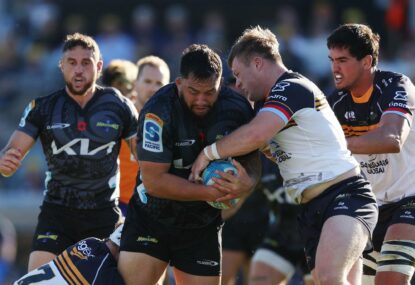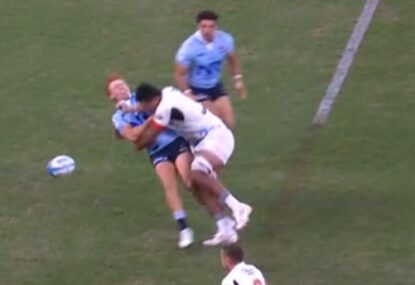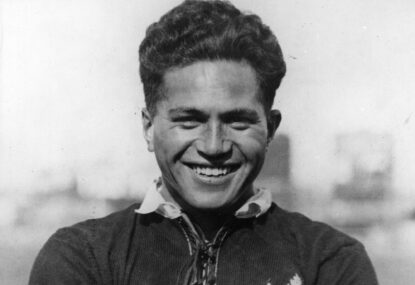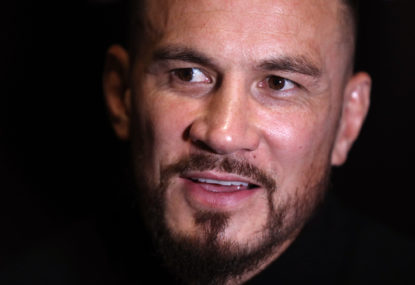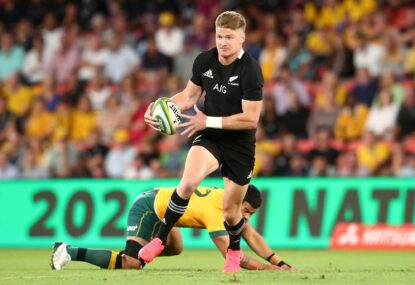Head down to your Tardis and set the clock for Saturday the ninth of July, destination Suncorp Stadium. Tonight Is the Super Rugby final of 2011, and you’re going to be watching referee Bryce Lawrence.
Some of you may have noticed the spray of criticism that came out of the comments section in several News Limited publications the following day regarding the way in which the final was refereed.
Rest assured, this article won’t be joining in and ridiculing the way It was, but will be analysing the attitude a rugby union referee should have to the concept of ‘flow’. During the Super Rugby final, there were countless examples of players from both sides deliberately breaking the laws of rugby.
These included:
• Consistently being in front of the last man’s feet at the breakdown
• Consistently being offside
• Killing the ball by going off feet
• Entering the ruck from the side
• Not releasing the tackled player
• Not rolling away
Referee Bryce Lawrence let a majority of these offences go unpenalised by both teams. I’m 100 percent sure that if you where to ask Bryce why, his response would have been, “Because the game needs to flow.”
As such, the game was a bitter territorial war, each team not really going anywhere on attack, or relying on moments of individual brilliance to achieve gains in territory.
The rucks, without proper enforcement by the referee, let’s face it, were about as clean as a bunch of pigs. And so, I question whether not blowing the game up really makes it flow more.
In fact, some of the higher scoring games I have seen have had high penalty counts. Why? Read on.
The reason the teams couldn’t get anywhere on attack at times was because the opposition was constantly marching up out of the line offside, catching the ball carrier behind the gain line.
The reason no-one could get quick ball from the ruck was that no-one was rolling away.
The reason that players were caught Isolated in their own half was that no-one had to release the tackled player before going for the ball.
And this situation was much similar to the Wallabies playing the All Blacks in Auckland a month later. Same referee, same problems for the Wallabies – but the All Blacks know how to play the game with Bryce Lawrence.
Enter Wayne Barnes. Ridiculed for his handling of the 2007 quarter final (for those of you who don’t know, he was twenty metres behind a huge break by the French and didn’t see a marginally forward pass) Barnes hasn’t had the easiest road into the rugby referee’s world.
But he is the best referee going around at the moment.
What Barnes does is let the game flow. He stops teams from making the game into a scrapheap where the attacking team doesn’t go anywhere. When I see that Wayne Barnes is refereeing, I know I’m In for a premium game of rugby.
Just look at Australia versus South Africa In Bloemfontein last year. Barnes ensured that everyone was onside and obeyed the rules around the ruck zone.
As such, the players got quick ball and eight magnificent tries were scored before Kurtley Beale kicked a penalty on full-time to win the game for Australia.
Around about now, most of you are screaming, “How does that work? Wouldn’t there just be a million penalties and the score end up being 6 – 3?”
The answer ladies and gentlemen, lies in another example, this time the week before Bloemfontein, at Loftus Versfield In Pretoria. Referee Nigel Owens made it clear that players flopping on to the ball off their feet at the breakdown would not be tolerated.
If someone even lost their footing for an instant, he penalised them. The first ten minutes of this game was a try-athon, with five tries in 13 minutes.
Both teams made the advantage line easily, and when the opposition slowed the ball down they got pinged off the park and someone would usually score a try. One of the tries was even directly from a quick tap, where Habana was caught isolated, support arrived but went off its feet for an instant, referee blew for a penalty, and Kurtley Beale quick tapped for Dean Mumm to score his first and only Test try.
After around ten minutes of continuous tries and penalties for going off feet, the game settles into a great contest, whereby no one violates the rules, and it becomes rugby union at its pulsating best.
Referees who go on a blitz in the first ten minutes let the players know not to violate the rules in any way, and the players adopt this mindset.
This is how to referee the game, enforce all of the rules for ten minutes, letting the players know where you stand, and then watch as the best of a game comes out.
And that’s exactly what Wayne Barnes did on Saturday, when the Wallabies defeated the All Blacks 25–20.






























































































